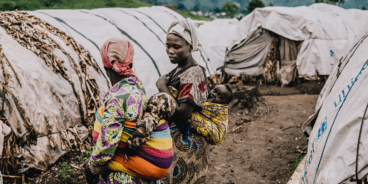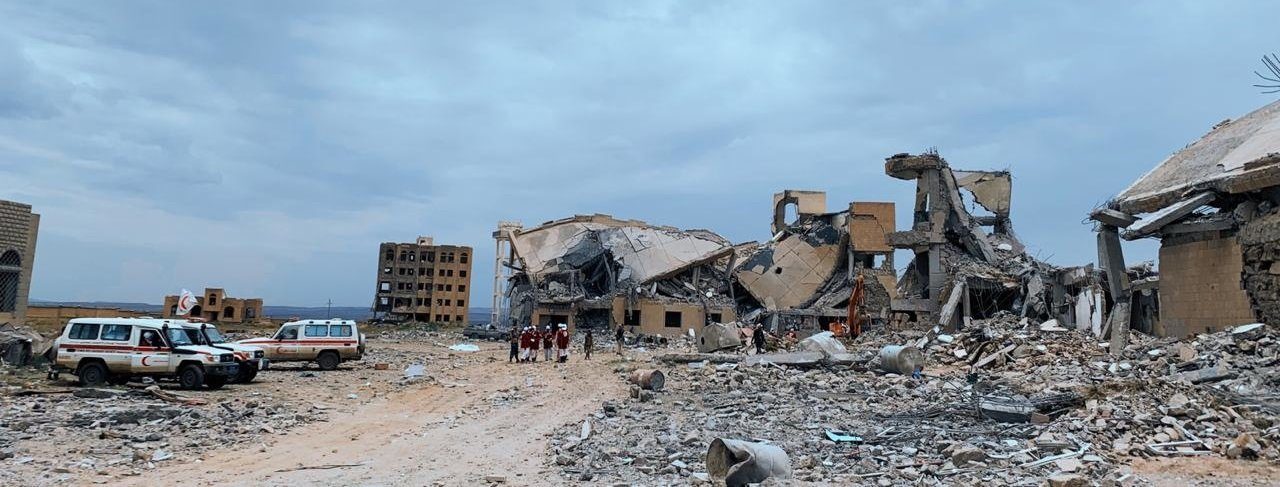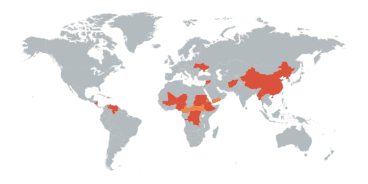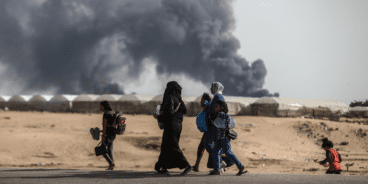

Atrocity Alert No. 170: Syria, Yemen and Bosnia and Herzegovina
Atrocity Alert is a weekly publication by the Global Centre for the Responsibility to Protect highlighting situations where populations are at risk of, or are enduring, mass atrocity crimes.
Syria: August escalation in Idlib, followed by a fragile ceasefire
Despite recent efforts to establish a ceasefire in Idlib – the last major area of Syria still held by armed opposition groups – the military offensive by the Syrian government and its Russian allies intensified throughout August. Last month saw a dramatic escalation in airstrikes and shelling – including the use of barrel bombs. According to Mark Lowcock, UN Under-Secretary-General for Humanitarian Affairs, “since the collapse of the conditional ceasefire on 5 August, dozens of communities have emptied out in northern Hama and southern Idlib… Satellite imagery shows entire towns and villages have been razed to the ground.” Thousands of people have fled to the Turkish border to escape the fighting and the Syrian Network for Human Rights has reported that 156 civilians have been killed in air strikes since 6 August.
On Friday, 30 August, Russia announced that Syrian government forces had agreed to a unilateral ceasefire in the Idlib de-escalation zone, “while reserving the right to respond to any violation by the terrorists.” Just before the announcement, Russian and Syrian government forces carried out airstrikes on the outskirts of the heavily-populated cities of Idlib and Maarat al-Numan, killing 12 civilians.
Idlib Governorate is home to around 3 million people, many of whom have already been displaced by fighting in other parts of the country. Since the launch of the offensive against Idlib in April, the UN has confirmed at least 1,089 civilian deaths, including over 100 children. At least 400,000 people have been displaced. A majority of children in Idlib province will also be unable to attend school this year. Save The Children recently documented that 87 education facilities have been destroyed and hundreds damaged during months of fighting.
The international community must act now to protect the lives of the millions of civilians living in Idlib Governorate and neighboring Hama and Aleppo. Hayat Tahrir al-Sham and all other armed groups should commit to the recent ceasefire and all parties must fully implement the September 2018 demilitarized zone agreement. Regardless of the duration of the ceasefire, all parties to the conflict must strictly uphold their obligations under International Humanitarian Law, including by upholding the provisions of UN Security Council Resolution 2286 (2016) regarding the protection of medical and humanitarian personnel in conflict zones.
Recent airstrike on prisoners is one of Yemen’s deadliest atrocities
On Sunday, 1 September, an airstrike by the Saudi Arabia and United Arab Emirates (UAE)-led international coalition in Yemen destroyed a detention facility run by the Houthis in Dhamar, killing or seriously wounding all the detainees. This attack, which resulted in at least 100 fatalities, is one of the deadliest since the beginning of the war in Yemen, which is now in its fifth year. The targeting of persons not taking part in hostilities, including prisoners, constitutes a war crime.
Sunday’s airstrike coincided with the release of the latest report by the Human Rights Council-mandated Group of Independent Eminent Experts on Yemen (GEE). The GEE documented violations and abuses committed by all parties to the conflict, including airstrikes, indiscriminate shelling, use of snipers and landmines, arbitrary detention, torture, sexual and gender-based violence, and impeding access to humanitarian aid. The report lists the main actors in the conflict, many of whom may be responsible for international crimes.
The GEE’s latest report also asserts that the United States, United Kingdom and France – all permanent members of the UN Security Council (UNSC) – may be complicit in violations perpetrated in Yemen due to their provision of military intelligence and logistical support, as well as arms, to the Saudi/UAE-led coalition. The report emphasizes that the Arms Trade Treaty, of which both France and the UK are States Parties, prohibits the authorization of arms transfers with the knowledge that these are likely to be used to commit war crimes.
Kamel Jendoubi, chairperson of the GEE, decried the impunity for atrocities and the lack of international action regarding the ongoing war in Yemen, insisting that, “the international community must stop turning a blind eye to these violations and the intolerable humanitarian situation.” On 29 August the UNSC adopted a Presidential Statement on the recent escalation of fighting in South Yemen. Since 2015 the Council has only passed three substantive resolutions on Yemen and has not effectively addressed the disproportionate civilian harm caused by ongoing airstrikes by the Saudi/UAE-led coalition.
The UNSC should invite the GEE to brief the Council on its recent findings. The mandate of the GEE should be renewed by the Human Rights Council during its upcoming 42nd session. In keeping with the Arms Trade Treaty, all UN member states should immediately halt the sale of weapons to parties to the conflict who routinely violate International Humanitarian Law in Yemen, including Saudi Arabia and the UAE.
Bosnia and Herzegovina told to compensate survivor of wartime sexual violence
On 22 August the UN Committee against Torture (CAT) called on the government of Bosnia and Herzegovina to pay compensation to a survivor of rape committed during the 1992-1995 Bosnian war. This is the first time the CAT has condemned the Bosnian authorities for failing to fulfill their obligations towards a survivor of sexual violence in conflict.
Tens of thousands of women and girls, as well as some men, were victims of sexual violence during the Bosnian war. The International Criminal Tribunal for the former Yugoslavia issued convictions for rape as a form of torture and crimes against humanity, and confirmed that rape may be used as a tool of genocide.
The survivor in the CAT decision previously won a case in June 2015 before the Court of Bosnia and Herzegovina Section I for War Crimes, which found former Bosnian Serb soldier Slavko Savić guilty of war crimes and required him to pay damages to the victim. According to the CAT, in the absence of financial means on the part of the individual perpetrator, the state is responsible under Article 14 of the Convention against Torture to ensure the victim receives adequate compensation.
This is also the first time the CAT issued a decision on the applicability of a statute of limitations in such cases. The survivor’s legal representation, Trial International, noted that “By ruling that statutes of limitations do not apply to victims of torture, the CAT has acknowledged the continuous trauma victims of torture experience. Statutes of limitations deprive survivors of the right to compensation and rehabilitation.”
Notably, the CAT decision also requires Bosnia and Herzegovina to establish “an effective reparation scheme at the national level to provide all forms of redress to victims of war crimes, including sexual violence.”
Related Publications


